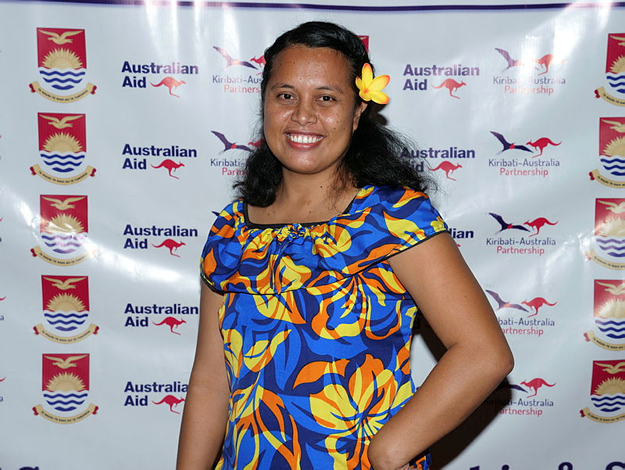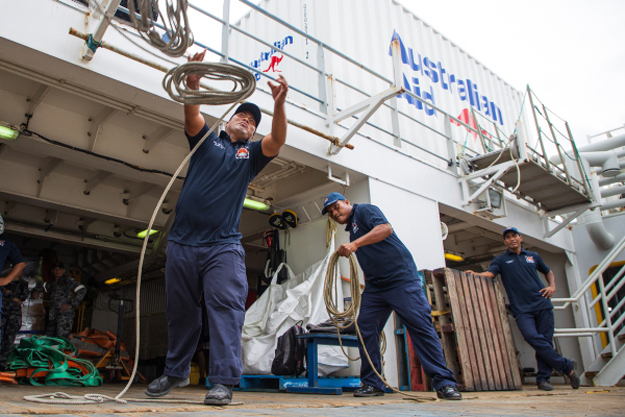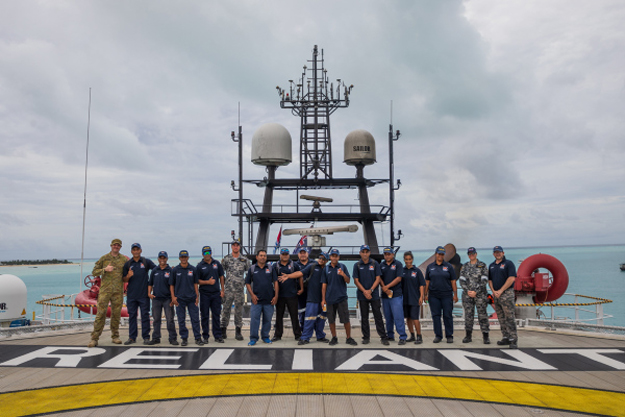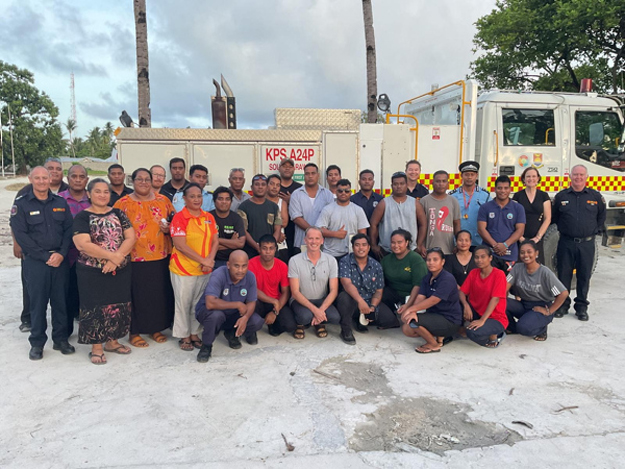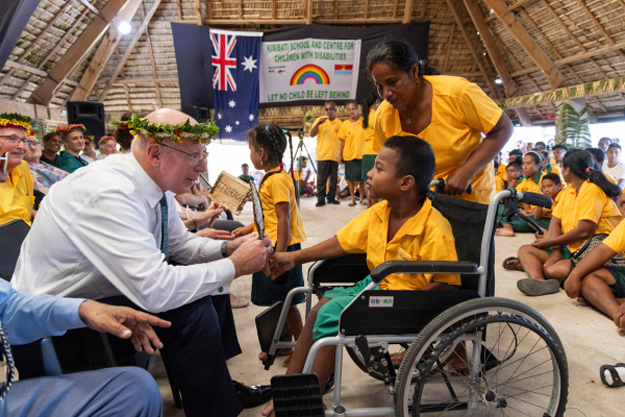Overview
Kiribati comprises 32 low-lying atolls and the raised phosphate island of Banaba. These atolls straddle the equator in the mid-Pacific Ocean. Kiribati has three groups of islands – the Gilbert Islands (16 populated atolls), the Phoenix Islands (8 unpopulated atolls, with the exception of a government outpost on Kanton) and the Line Islands in the east (8 of the 11 atolls are part of Kiribati and three – Kingman Reef, Palmyra Atoll and Jarvis Islands – are US territories). Only three of the Line islands have populations: Kiritimati (Christmas Island) – the largest atoll in the world, Teraina (Washington Island) and Tabeuran (Fanning Island).
Kiribati's atolls are wide-spread, mostly less than two metres above sea level and vulnerable to the impacts of climate change. They total 811 square kilometres of land distributed over 3.5 million square kilometres of ocean – an area the size of Western Australia and South Australia together.
Kiribati's population is estimated at 134,518 (World Bank). The atoll of Tarawa in the Gilbert's group is the capital, and its crowded southern arm contains half the country's population. Most of the remaining population also lives in the Gilbert Islands.
Political overview
Kiribati achieved independence from the United Kingdom on 12 July 1979. It has a 45-member unicameral parliament, 44 members of which are elected, and one is appointed: the Member of Parliament (MP) chosen by the Rabi Council to serve the interests of those I-Kiribati originally from Banaba, but who now live on the Fijian Island of Rabi. The Speaker is elected ex-officio by the Members of Parliament. While the Speaker must meet the qualification to be a Member of Parliament, he/she is not a Member of Parliament and has neither an original nor a deciding vote.
Members of Parliament are elected for a four-year term by non-compulsory universal adult suffrage. Once parliamentary elections are completed, the Members of Parliament meet and nominate at least three and no more than four presidential candidates. A President (Te Beretitenti) is then elected by popular vote, on a first-past-the-post basis.
The President is both Head of Government and Head of State, and holds ministerial responsibility for Foreign Affairs, Police and, the Public Service. He/she appoints from the Parliament a Cabinet of no more than 12 others including the Vice President (also a minister) and the Attorney-General.
At the October 2024 Presidential elections, His Excellency Taneti Maamau was re-elected President (for a third term).
Bilateral relations
Kiribati and Australia share an ambition for our Blue Pacific continent – peaceful, prosperous and respectful of sovereignty. We enjoy close and longstanding relations based on regional and international cooperation, trade links, a substantial development assistance program, support for maritime surveillance and broader security cooperation, and people to people links.
People to people links
Australia Awards
Australia supports the development of a skilled workforce in Kiribati through technical and vocational training and scholarships (Australia Awards). These awards provide opportunities for I-Kiribati students to study at tertiary institutions in the Pacific or Australia. They enable students to gain the skills and knowledge needed to contribute to their and Kiribati's development.
As of September 2025, a total of 66 Kiribati students were studying in Australia or regional universities in Fiji including 24 mobilised in 2025 (20 to Australia and four to Fiji). With very limited tertiary courses available in Kiribati, these scholarships are helping the Government of Kiribati to meet the training and human resource development needs of the country. There are approximately 650 I-Kiribati Australia Awards alumni.
More information on Australia Awards.
Labour mobility initiatives
Kiribati participates in the Pacific Australia Labour Mobility (PALM) scheme which allows eligible Australian employers to recruit workers for seasonal jobs for up to nine months or longer-term roles for between one and four years to help fill labour gaps in rural and regional Australia, and nationally for agriculture and select agriculture-related food product manufacturing sectors. It enables i-Kiribati workers to take up jobs in Australia, develop their skills and send income home to support their families and communities in Kiribati. Pacific labour mobility also helps strengthen links between people, businesses and communities, fostering deeper connections between Australia and Kiribati.
As at November 2025 there were 1,520 I-Kiribati workers participating in the PALM scheme, predominantly employed in the agriculture and meat processing sectors.
For more information visit the Pacific Australia Labour Mobility scheme website.
Volunteers
The Australian Volunteers program promotes economic growth and poverty reduction in the Indo-Pacific region through capacity building in host organisations to deliver effective and sustainable development outcomes. As of September 2025, there were five volunteers in Kiribati. These volunteers are embedded within both government offices and with non-governmental organisations (NGOs) supporting gender equality, legal services and land management. The program has a one-stop entry point to Australian volunteering.
See the Australian Volunteers program website for more information.
Learning Exchanges
Australia and Kiribati engage in a number of people to people exchanges that promote learning opportunities across a range of different areas – including fire and emergency training, policing, maritime security, sport and humanitarian and disaster preparedness.
Development assistance
More information on development assistance to Kiribati.
Economic overview
Kiribati, in common with other small island atoll states, faces significant challenges because of its remoteness, lack of scale and vulnerability to external shocks and environmental stress. Internal and external remoteness as well as weakness in the business climate has kept the private sector small. This constrains economic growth and puts a strain on public finances.
Kiribati relies heavily on fishing revenue and remittances from citizens employed abroad, mainly seafarers. These are both affected by circumstances outside of the Government of Kiribati's control, in particular fish migratory patterns and the state of the global economy.
Notwithstanding its limited resources, Kiribati has largely had a solid record of financial stability since independence in 1979. Governments have adopted a cautious approach to domestic spending combined with a deliberate policy of investing additional funds in Kiribati's sovereign wealth fund, the Revenue Equalisation Reserve Fund (RERF). The RERF is used to supplement recurrent revenues and smooth volatility in other income sources, for example seasonal fluctuations in fishing revenue.
In recent years Kiribati has experienced modest levels of economic growth. Revenues from fishing licence fees remain critical to economic stability and the introduction of a new social protection regime has been a major source of economic stimulus. Donor-financed infrastructure projects (notably in the water, energy and education sectors) have also helped to boost growth. Steps are being taken to reduce the many hurdles to private sector growth that Kiribati faces, including high transportation and communication costs and the increasing impact of climate change.
Trade and investment: Australian merchandise exports to Kiribati in 2022 totalled $28 million. Australian currency is legal tender in Kiribati. The ANZ Bank is the majority owner of the Bank of Kiribati (trading as ANZ), which provides central and retail banking services and is the only bank in the country.
High level visits
January 2025: Deputy Prime Minister and Minister for Defence, Richard Marles, visited Kiribati and met with the Hon Vice President Teuea Toatu and other Ministers. The Deputy Prime Minister attended the commissioning of the new Guardian-class Patrol Boat RKS Tobwaan Mainiku.
June 2023: Former Governor General, H.E. General the Hon David Hurley AC DSC (Retd), and Mrs Hurley visited Kiribati.
February 2023: Minister for Foreign Affairs, Senator the Hon Penny Wong visited Kiribati and signed the Tobwaan Te Reitaki (Nurturing Cooperation) Memorandum of Understanding with H.E. President of Kiribati, Taneti Maamau.
July 2017: Then Minister for International Development and the Pacific, Senator the Hon Concetta Fierravanti-Wells undertook a bipartisan visit to Kiribati with the Shadow Minister for International Development and the Pacific, Senator Claire Moore.
March 2015: Then Minister for Foreign Affairs, the Hon Julie Bishop, visited Kiribati to meet senior Kiribati government ministers and reaffirm Australia's support for a strong partnership with Kiribati.
May 2014: Senator, the Hon Brett Mason, visited Kiribati for the Forum Trade Ministers' Meeting.
February 2013: Then Foreign Minister, Senator the Hon Bob Carr was the first Australian Foreign Minister to visit Kiribati since 1998.
August 2012: Then Parliamentary Secretary for Foreign Affairs, the Hon Richard Marles, MP made a bilateral visit.
July 2012: Then Parliamentary Secretary to the Treasurer, the Hon Bernie Ripoll, visited for the Forum Economic Ministers Meeting
March 2012: Then Governor-General, the Hon Dame Quentin Bryce, visited Kiribati. She was accompanied by then Parliamentary Secretary for Pacific Island Affairs, Hon Richard Marles, MP.



